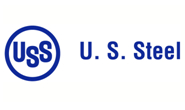Market Segment

March 12, 2021
USS Sees Strong Q1 as Record Spot Prices Move Contracts Higher
Written by Michael Cowden
U.S. Steel expects a solid first quarter thanks to firm demand and as record high flat-rolled steel prices flow through to its bottom line.
“Strong market conditions and our well-timed acquisition of Big River Steel are allowing us to drive significant earnings growth,” U. S. Steel President and Chief Executive Officer David B. Burritt said in first-quarter earnings guidance.
![]() All told, the Pittsburgh-based steelmaker forecasts adjusted net income, a figure that does not include costs related to acquiring Big River Steel, of $160 million.
All told, the Pittsburgh-based steelmaker forecasts adjusted net income, a figure that does not include costs related to acquiring Big River Steel, of $160 million.
And U.S. Steel’s flat-rolled segment is slated to record significantly higher earnings before interest, taxes, depreciation and amortization (EBITDA) in the first quarter versus the fourth quarter.
The anticipated gain comes thanks to average selling prices moving higher as adjustable-price contracts move upward and as annual fixed-price contracts reset at higher levels, the company said.
Contract prices typically follow spot prices on a lag. Steel Market Update’s average price for spot hot-rolled coil stands at $1,270 per ton ($63.50/cwt), an all-time high. That figures is up 7.6% from $1,180 per ton a month ago and up 28.9% from $985 per ton at the beginning of the year.
And U.S. Steel thinks the good times will keep on rolling. “Solid market fundamentals, low steel supply chain inventories, continued consumer-driven demand, and pent-up infrastructure demand has us increasingly bullish,” Burritt said.
The first quarter will also mark the debut of U.S. Steel’s “Mini Mill” segment, which was created to showcase the performance of Big River Steel.
U.S. Steel acquired a 49.9% stake in the Osceola, Ark., based electric-arc furnace steelmaker in 2019 and scooped up the remaining 50.1% in January for $774 million.
The company downplayed the impact of severe weather last month, which resulted in power outages, gas shortages and temporary production disruptions in the southern U.S. and northern Mexico.
Big River Steel was among the mills hit by the cold snap, market participants have said.
“Regional weather-related impacts on operations that occurred in February are not expected to impact Big River’s ability to fulfill customer commitments in the quarter,” U.S. Steel said.
U.S. Steel also anticipates a strong showing from its flat-rolled steel operations in Košice, Slovakia, despite the global microchip shortage hurting European automotive output. All three blast furnaces at the Slovakian mill are running, the company noted.
On the energy front, U.S. Steel’s tubular segment, which produces oil country tubular goods (OCTG), is seeing increased demand as drilling activity recovers. But the company said that tubular prices “are only beginning to reflect improved activity” and that “stubbornly high import levels” are weighing on tags.
U.S. Steel’s seamless tube mill in Lorain, Ohio, and its Lone Star welded OCTG operations in Texas as a result remain “indefinitely idled.”
OCTG is used to extract oil and natural gas from wells.
The U.S. was licensed to import 79,581.2 tonnes of OCTG in February, up 7.5% from 74,002.70 tonnes in January and up approximately 6% from 75,106.40 tonnes in February of last year, according to Commerce Department figures.
February’s higher volumes resulted largely from South Korean OCTG imports weighing in at 37,778.20 tonnes, more than triple the 10,455.20 tonnes that arrived from the East Asian nation in January, per Commerce figures.
By Michael Cowden, Michael@SteelMarketUpdate.com







